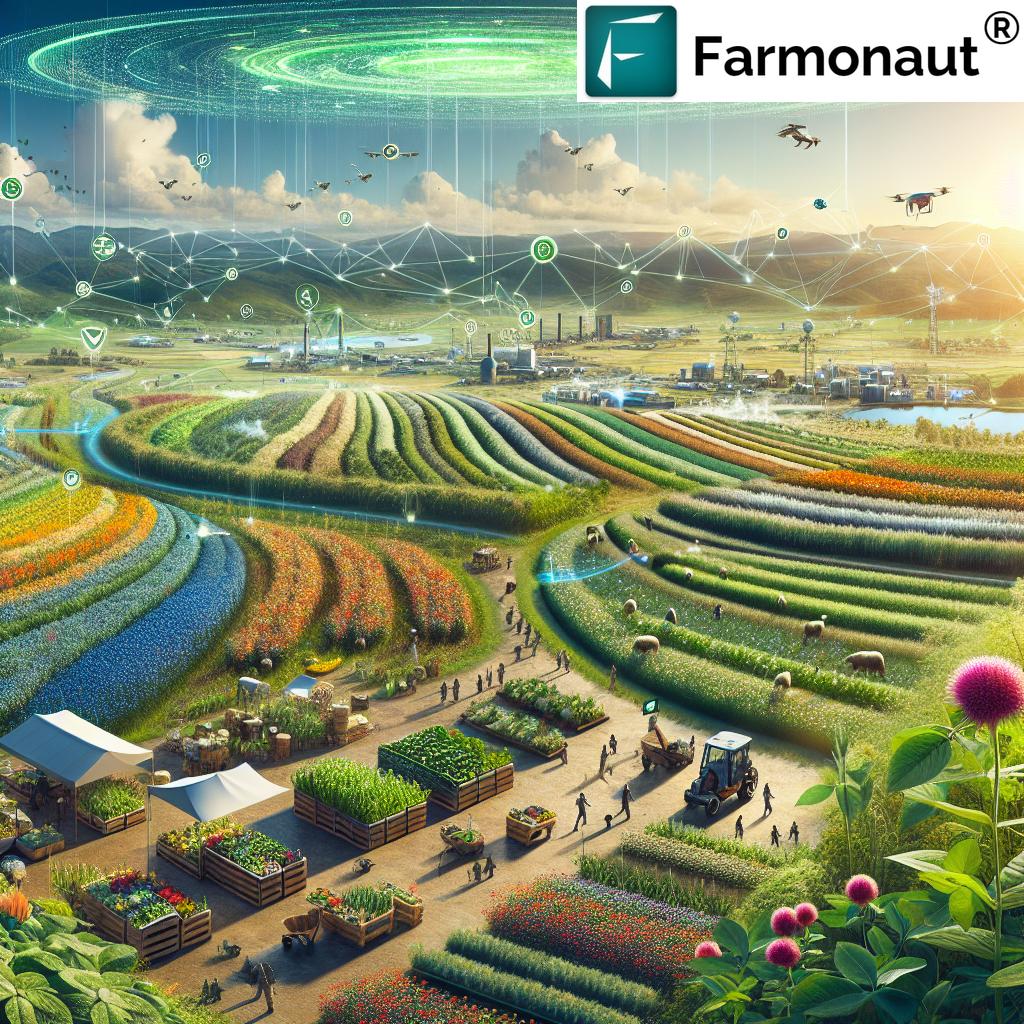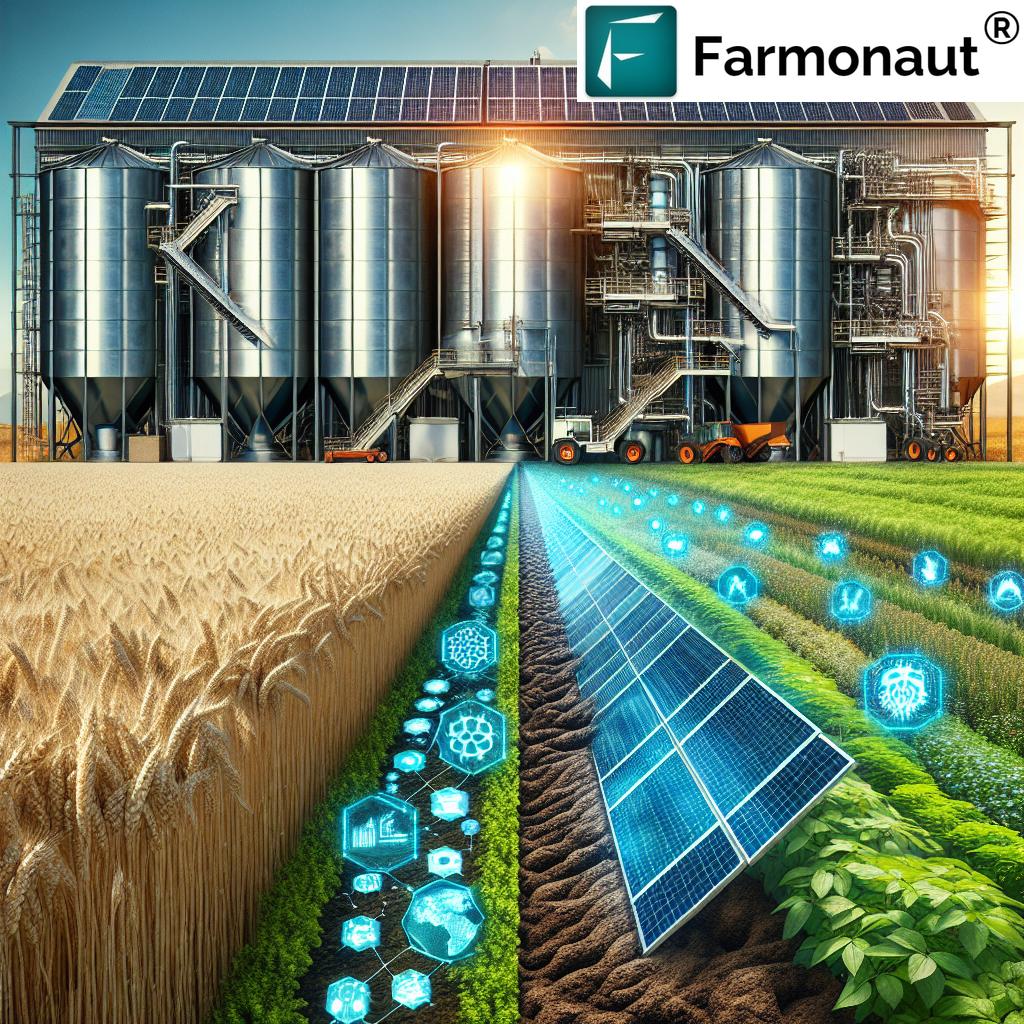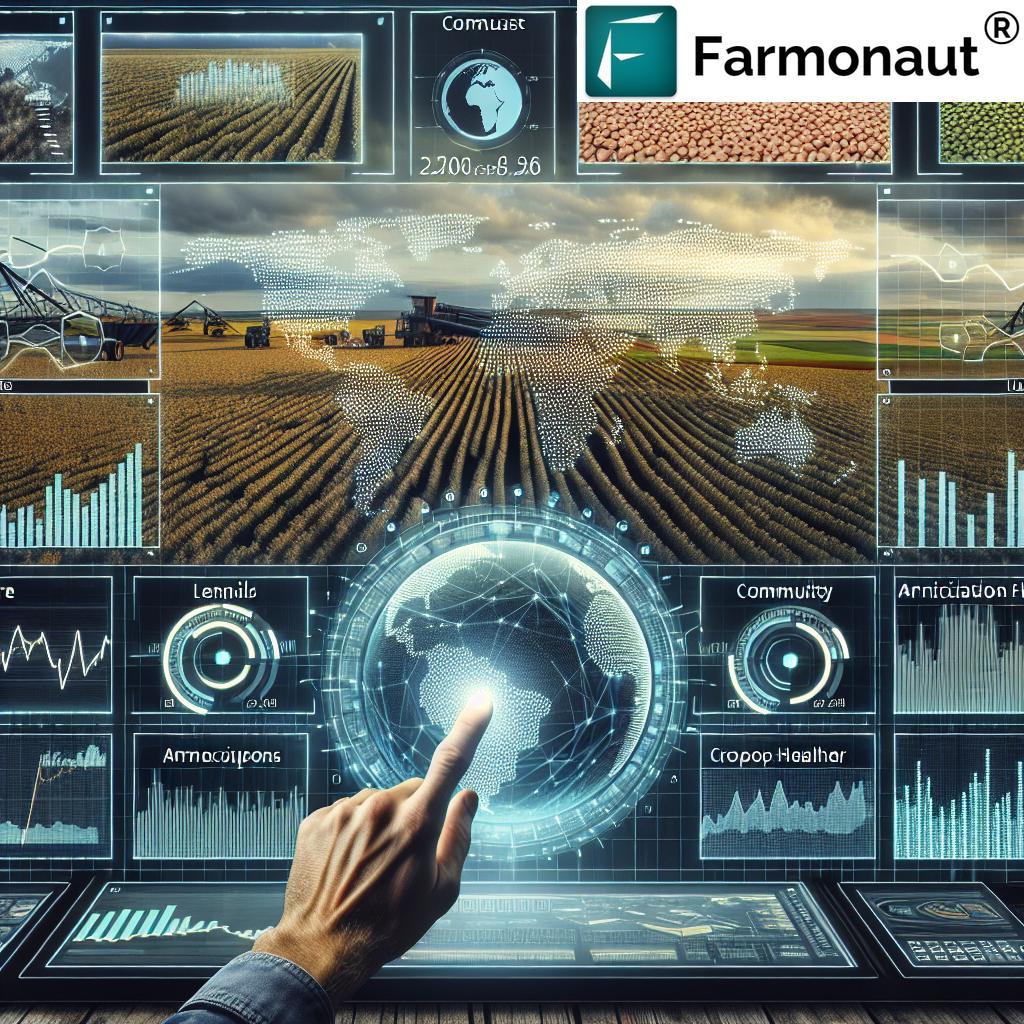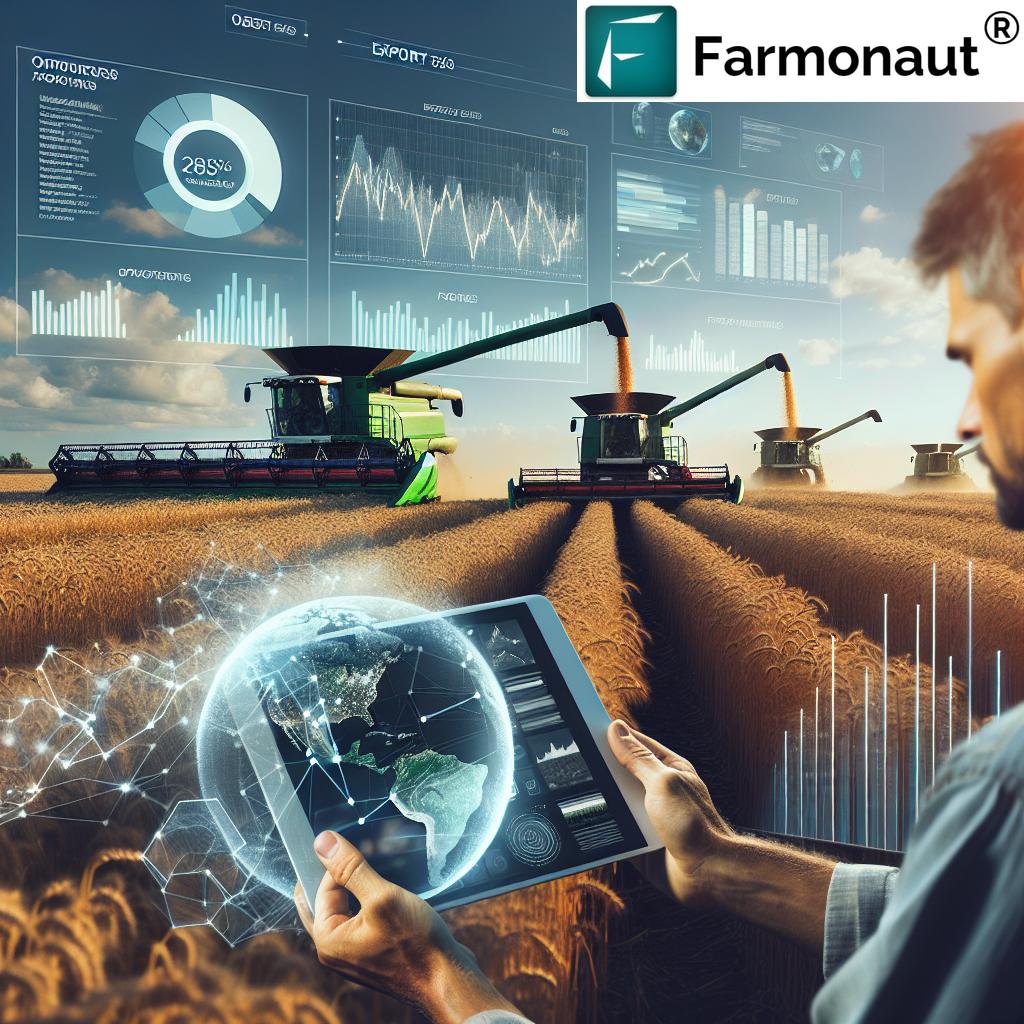Company Partners with XRPL for Blockchain Agriculture Use Cases: How Blockchain, Carbon Credit Registries, and FMUs are Fueling Sustainable Agriculture in 2025
“Over $1.5 billion in carbon credits are traded globally each year, with blockchain boosting transparency in agriculture markets.”
Introduction: Agriculture at the Center Stage of Climate Solutions in 2025
In 2025, sustainable agriculture has truly taken center stage as the global community intensifies efforts to combat climate change and promote environmental stewardship. Agriculture, long recognized as a major contributor to global greenhouse gas emissions, is undergoing a seismic transformation. An interconnected mesh of advanced technologies — especially blockchain, carbon credit registries, and Farm Management Units (FMUs) — is now redefining sustainability goals, transparency, and impact across global farming systems.
One key development fueling this transformation is the deployment of energy-efficient, scalable blockchain solutions such as the XRP Ledger (XRPL), unlocking verified, credible, and traceable carbon credits for farmers and industry alike. As companies invest in the integration of blockchain-powered carbon credit registry FMUs, the result is an innovative ecosystem that democratizes access, incentivizes climate-smart practices, and accelerates the shift towards resilient, climate-positive agriculture. In this blog, we’ll explore how the company partnered with blockchain laboratories xrpl carbon credit registry fmus, blockchain agriculture use cases, are revolutionizing agriculture and environmental management.
The Evolution of Blockchain Agriculture Use Cases
Blockchain agriculture use cases are rapidly expanding far beyond the early hype of cryptocurrency or simple record-keeping. In 2025, these use cases are laser-focused on maximizing sustainability, transparency, traceability, and verified environmental impact within and beyond the farm gate. Let’s break down why this matters:
- Transparency: Conventional farming and carbon accounting systems have long struggled with opaque record-keeping, fragmented data, and challenges in verifying sustainability claims. Blockchain addresses these by recording all transactions and data in a tamper-proof, immutable ledger.
- Traceability: With mounting consumer and regulatory demand for traceable, low-emission, and authentic agricultural products, blockchain-enabled traceability is now essential. It connects every stage of the supply chain, assuring that claims about “carbon-neutral” or “climate-positive” products are science-based and verifiable.
- Decentralization and Immutability: Unlike centralized systems vulnerable to manipulation and errors, decentralized blockchains like XRPL provide a verifiable single source of truth, making data manipulation nearly impossible.
- Carbon Credit Registry: By automating carbon credit registries using smart contracts, blockchain ensures verifiable carbon credits, prevents double-counting, and significantly speeds up the issuance of credits upon validation of emission reductions or sequestration within FMUs.
- Fast and Low-Energy Transactions: Modern blockchain ledgers, such as XRPL, ensure near-instant, low-energy transactions, aligning perfectly with the goals of sustainable agriculture and environmentally conscious industries.
“Blockchain-powered Farm Management Units (FMUs) can increase traceability of agricultural products by up to 70%.”
Understanding XRPL, Carbon Credit Registries, and FMUs
The XRPL (XRP Ledger) sets itself apart as an open-source, energy-efficient blockchain platform optimized for fast, robust, and cost-effective digital asset transactions — vital for agriculture and carbon credit registries that require scalable, eco-friendly solutions.
What is an FMU?
- FMU (Farm Management Unit): A discrete parcel, field, or operation within a larger agricultural landscape, representing an ideal node for granular data collection and tracking. Each FMU can be mapped, digitized, and monitored separately, providing a high-resolution baseline for monitoring carbon sequestration, productivity, and sustainability outcomes.
Why Use Blockchain in Carbon Credit Registries?
- Data Authenticity & Immutability: Prevents fraud, ensures data can’t be tampered with or erased, and offers credibility to global carbon markets.
- Prevents Double Counting: Each credit can only be issued and traded once, safeguarding the registry’s credibility and compliance with voluntary and regulatory carbon markets.
- Timely Credit Issuance: Smart contracts automatically issue verified credits based on real-time data, eliminating inefficiency and delays.
- Transparency and Traceability: Blockchain’s public ledger structure ensures all actors (farmers, companies, regulators, consumers) access the same verifiable data.
How Blockchain Reinvents Carbon Credit Registries and FMUs
The integration of blockchain with carbon credit registries and FMUs yields a step change in agricultural sustainability. Here’s how:
- Registration and Tracking: Each FMU gets a blockchain-based digital identity. Satellite and IoT-based data flows into these identities, enabling real-time tracking of carbon sequestration, emissions, soil health, water use, and yield.
- Verification and Validation: Blockchain protocols, in combination with IoT sensors and satellite analytics, validate actual field activities (e.g., agroforestry, cover cropping, reduced tillage). Only when satellite, sensor, and model data confirm an activity is complete does the registry issue a new, verified carbon credit.
- Automated Credit Issuance and Marketplace Integration: When pre-defined thresholds are met, smart contracts auto-issue carbon credits registered on the XRPL. Credits become immediately tradable on global carbon markets or can be purchased directly by corporations seeking to meet carbon neutrality or CSR targets.
- Supply Chain Integration: Carbon credits, along with other sustainability data, are transparently linked to products from each FMU. Brands can certify and market “climate-positive” or “carbon-neutral” products based on verifiable, immutable blockchain data.
The Blockchain-Enabled Farm Management Model (With FMUs)
In practice, blockchain agriculture use cases based on FMUs look like this:
- Satellite Monitoring and IoT Integration: FMUs are monitored via satellite imaging, ground sensors, and IoT devices to continuously record real-world activities, environmental parameters, and resource usage. This granular real-time data collection is the foundational evidence base for carbon accounting and verification.
- Blockchain Ledger as Core Registry: All events, credit accruals, and asset transfers are stored on the XRPL, providing immutable, timestamped records. Each unit of sustainability information — from emissions reduction to water conservation — is securely captured within the ledger.
- Participating Farmers and Stakeholders: Each participant is issued a digital identity, enabling transparent participation in the carbon market, real-time feedback, and full auditability of their contributions within the ecosystem.
- Marketplace Connection: Once credits are issued, they flow into a digital marketplace, promoting rapid access to revenue for farmers and transparent purchases for corporations and institutional buyers.
Our Role in Sustainable Agriculture: Farmonaut’s Satellite, AI & Blockchain Integration
At Farmonaut, we harness the convergence of satellite imaging, artificial intelligence (AI), and blockchain to offer actionable solutions for sustainability challenges in agriculture, mining, infrastructure, and environmental management. Our commitment is to democratize access to digital, data-driven tools that advance global sustainability goals.
Key Offerings From Farmonaut:
- Satellite-Based Monitoring: Providing real-time, multispectral imagery for accurate monitoring of soil health, crop yields, water use, and environmental metrics. This precision forms the backbone for effective FMU management and digital verification, supporting carbon footprinting and emissions tracking.
- AI-Driven Advisory: Our Jeevn AI generates custom insights using evolving satellite, weather, and crop data to support major agricultural decisions — from planting and irrigation schedules to pest management and yield optimization.
- Blockchain-Based Traceability: Leveraging blockchain, we provide end-to-end traceability for crops and agricultural products, ensuring supply chain transparency, fair-trade validation, and verified environmental claims. Our Traceability Solution guarantees product authenticity — click to learn more.
- Fleet and Resource Management: We offer scalable resource and fleet management tools, empowering operations to reduce costs, enhance safety, and improve logistics efficiency.
- API Integration: Developers and businesses can seamlessly integrate our satellite analytics, Farmonaut API, and blockchain-based insights into their platforms or workflows. For setup and integration help, visit our API developer documentation.
We serve individual users (smallholder farmers, agronomists), enterprises (agriculture, mining, infrastructure), governments and research institutions, and financial institutions (banks, crop insurance providers). Our platform is available via:
Technology Stack: FMUs, Carbon Credit Registry, and Blockchain Integration
How the Technology Mesh Works:
- Satellites & Remote Sensing: Generate frequent, high-resolution images of fields, enabling measurement of vegetation health, soil carbon levels, and activities like agroforestry or reduced tillage.
- IoT Sensors: Placed within or around FMUs, these devices monitor soil conditions, moisture, temperature, and even farm equipment use in real time.
- Blockchain Ledger: All this granular data is streamed (and often hashed) onto the XRPL carbon credit registry, becoming part of a decentralized, public register.
- AI and Machine Learning: Continuously analyze and predict trends, verify data completeness, and support automated decisions for carbon credit issuance or anomaly detection.
- APIs and Interoperability: Systems are interconnected via APIs (like our Farmonaut API), enabling seamless data exchange, reporting, and automated reporting to stakeholders or authorities.
Key Benefits for Farmers, Supply Chains, and Global Agricultural Systems
The combination of blockchain, carbon credit registries, and FMUs is redefining value and positioning farmers as the vanguards of environmental stewardship:
- Verified Carbon Credits: Farmers can reliably generate, hold, and trade verified carbon credits based on their actual reduction activities — such as agroforestry, cover cropping, reduced tillage, or biochar application.
- New Revenue Streams: Participation in carbon markets provides direct financial incentives to farmers who adopt sustainable practices, offering profit alongside climate impact.
- Improved Access to Finance: Financial institutions (banks, insurance) benefit from verifiable and risk-reduced lending thanks to immutable, transparent data and automated verification.
- Enhanced Supply Chain Credibility: Digital traceability underpinned by blockchain builds more trustworthy, consumer-friendly supply chains, giving brands the evidence base for climate-positive claims.
- Efficient and Automated Operations: Processes are streamlined, audit times slashed, and manual record-keeping is replaced by automated, real-time monitoring and reporting.
- Scale and Interoperability: The approach is inherently scalable — the technology stack supports everyone from smallholder FMUs to large, multi-national agricultural operations.
- Environmental Safeguards: Proactive monitoring helps identify and address soil degradation, water stress, emissions hotspots, or other negative impacts before they become critical.
Comparative Feature Table: Traditional Agriculture vs Blockchain-Enabled Agriculture
| Approach/Technology | Transparency Level | Traceability | Carbon Credit Integration (Estimated Impact) | Use of FMUs | Environmental Impact (Estimated Reduction in Emissions) |
|---|---|---|---|---|---|
| Traditional Agriculture | Low to Moderate (fragmented data, manual reporting, prone to error/manipulation) |
Limited (traceability up to 30% in most supply chains, vulnerability to fraud) |
Low (manual verification, delays in issuance, high risk of double-counting) |
Rarely Used (lack of granular operational tracking at FMU/field level) |
5–10% (est. reduction with available practices, poor monitoring) |
| Blockchain-Enabled Agriculture (Farmonaut + XRPL) | High (decentralized, immutable, fully auditable and automated data/records) |
Very High (traceability >70%, blockchain storage prevents manipulation, supports compliance) |
High (automated, immediate issuance of verified credits from FMU-level data) |
Widely Used (FMU-based monitoring, digital identities, granular field tracking) |
20–40% (est. emission reduction with precision and tech-driven practices) |
Beyond Carbon Credits: Expanding Blockchain Agriculture Use Cases in 2025
The impact of blockchain in agriculture extends well beyond carbon markets. In 2025 and beyond, blockchain agriculture use cases are set to revolutionize virtually every facet of the global food system:
- Product Traceability & Food Safety: End-to-end blockchain traceability — from seed to shelf — prevents food fraud and supports recall management.
- Fair-Trade and Certification: Blockchain is being used to authenticate fair-trade, organic, and specialty product claims, benefiting both producers and conscientious consumers.
- Land Title & Asset Management: Decentralized registries for land enable rapid, undisputed property rights verification, crucial for smallholder farmers and secure collateralization in financing.
- Smart Contracts & Automation: Automating procurement, payment, logistics, and compliance checks — minimizing human error and ensuring on-time, accurate transactions.
- Fleet Management: With technologies like Farmonaut’s fleet management, agricultural, mining, and infrastructure managers can optimize vehicle and equipment usage efficiently and sustainably.
- Large-Scale Farm Management: Enterprises use systems such as Farmonaut’s Agro Admin App for scalable, digital oversight and task automation across extensive FMUs.
- Yield Prediction Systems: By merging AI, satellite data, and blockchain, accuracy in yield estimation is enhanced — vital for food security and forward contracts.
- Policy and Climate Monitoring: Governments and industry stakeholders benefit from real-time, credible monitoring for regulatory compliance and proactive climate change adaptation.
Frequently Asked Questions (FAQs)
1. What are FMUs, and why are they important in blockchain-powered agriculture?
Farm Management Units (FMUs) are discrete plots, fields, or operations mapped within larger agricultural landscapes. Their digitization allows detailed, high-resolution environmental and operational data collection, making them critical building blocks for credible carbon accounting and sustainability traceability in blockchain-enabled systems.
2. How does blockchain technology improve carbon credit registries?
Blockchain provides immutability, decentralization, and transparency. It ensures carbon credits are issued only once, cannot be tampered with, and are linked directly to actual farm activities and scientific data. Smart contracts also expedite and automate the issuance, transfer, and audit of credits.
3. Can smallholder farmers benefit from blockchain agriculture use cases?
Yes, especially through automated, transparent, and accessible credit generation, traceability, and finance. As more regions adopt these platforms, barriers for smallholders to join global carbon markets are vastly reduced, and digital records enhance market access.
4. What are the environmental impacts of using blockchain in agriculture?
Studies and pilot projects show emission reduction rates of 20–40% are possible when blockchain and digital verification are paired with climate-smart agricultural practices. Improvements in traceability, anti-fraud, and real-time feedback mechanisms further enhance the overall impact.
5. Besides carbon credits, what other blockchain agriculture use cases exist?
Beyond carbon, blockchain supports end-to-end traceability, automated compliance management, crop insurance verification, smart supply chain contracts, and even land tenure security.
Affordable, Scalable Farmonaut Subscriptions
We are committed to making satellite, AI, and blockchain technology affordable. Our subscription packages are tailored for individual users, enterprises, governments, and financial institutions. Scale services as your operation grows — pay only for what you need.
Conclusion: The Future of Sustainable Farming, Carbon Credit Registry, and Blockchain Agriculture
As we look beyond 2025, the convergence of blockchain technology, XRPL, carbon credit registries, and Farm Management Units is a watershed moment for sustainable agriculture. This synergy is empowering farmers, catalyzing transparent and robust carbon markets, and fostering a new era of digital, climate-smart food systems.
At Farmonaut, our mission is to drive efficiency, transparency, and sustainability for all stakeholders by providing advanced, accessible, and scalable digital tools. By leveraging satellite monitoring, AI advisory, and blockchain-based traceability, we are enabling holistic, data-driven management of agricultural, mining, and infrastructure projects — all while supporting environmental stewardship and global decarbonization goals.
As technology continues to evolve, and company partnered with blockchain laboratories xrpl carbon credit registry fmus, blockchain agriculture use cases expand, the potential for meaningful impact across landscapes, supply chains, and economies will only grow. This is the dawn of a new, resilient, and trustworthy global agriculture ecosystem — one where transparent data, credible claims, and sustainability are foundational, not aspirational.













